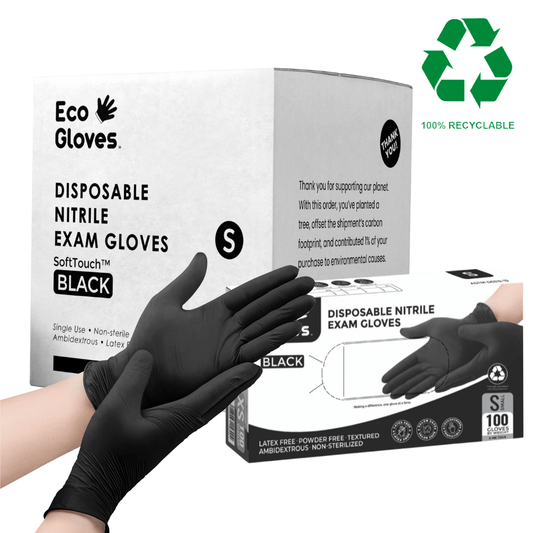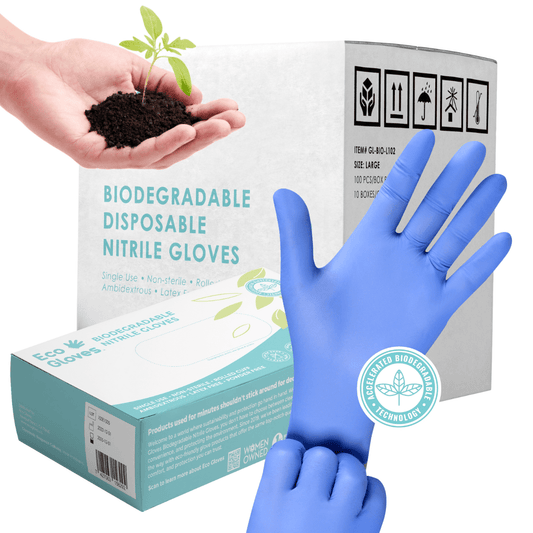The Rise of Compostable Food Prep Gloves, Cups, Bags, and Straws: A Sustainable Shift for Businesses
Eco Gloves
In today's world, sustainability has become a primary focus for businesses and consumers alike. From food service establishments to corporate offices, the adoption of compostable disposable items, such as food prep gloves, compostable cups, bags, and straws, is on the rise. This shift is not just about reducing plastic waste but also about minimizing the environmental impact of everyday operations. In this article, we will explore the benefits of compostable products, highlight industry leaders making eco-friendly choices, and delve into the long-term advantages for businesses embracing these solutions.
Topics Covered
- Environmental Impact of Traditional Disposable Products
- What Are Compostable Products?
- The Advantages of Compostable Alternatives
- Fortune 500 Companies Leading the Way
- Compostable Food Prep Gloves: A Sustainable Choice
- Compostable Cups: The Eco-Friendly Beverage Solution
- Compostable Bags: Reducing Plastic in the Supply Chain
- Paper and Compostable Straws: Small Change, Big Impact
- The Business Case for Compostable Products
- How More Businesses Are Adopting Eco-Friendly Disposables
- Key Takeaways: The Rise of Compostable Food Prep Gloves, Cups, Bags, and Straws
-
Frequently Asked Questions About Compostable Products for Businesses
Environmental Impact of Traditional Disposable Products
The environmental footprint of traditional disposable items is staggering. According to the Environmental Protection Agency (EPA), over 35.7 million tons of plastic waste was generated in 2018 in the U.S. alone, and that number has increased significantly over the years. This waste not only pollutes landfills but also contributes to the plastic debris accumulating in oceans and waterways, harming wildlife and ecosystems.
Plastic straws alone account for a significant portion of this waste. It is estimated that over 500 million plastic straws are used daily in the United States, the majority of which end up in the environment. Additionally, disposable plastic gloves, often used in food preparation, medical settings, and various industries, contribute significantly to the growing plastic waste crisis.
What Are Compostable Products?
Compostable products are items made from organic materials that can decompose naturally, turning into nutrient-rich compost. Unlike traditional plastics, which take hundreds of years to break down, compostable products can biodegrade within a few months when properly composted. Items such as compostable food prep gloves, cups, bags, and straws offer an eco-friendly alternative to single-use plastics, significantly reducing the amount of waste sent to landfills.
The Advantages of Compostable Alternatives
Adopting compostable products like food prep gloves, compostable cups, and bags offers numerous advantages:
- Reduced Environmental Impact: Compostable products break down naturally and return nutrients to the soil, reducing landfill waste and ocean pollution.
- Lower Carbon Footprint: The production of compostable items typically requires less energy and generates fewer greenhouse gasses compared to traditional plastics.
- Compliance with Sustainability Goals: Many businesses are adopting compostable items as part of their commitment to sustainability, which can boost their brand image and appeal to environmentally conscious consumers.
-
Support for a Circular Economy: Compostable products support a circular economy by ensuring materials are reused and recycled, rather than discarded after a single use.
Fortune 500 Companies Leading the Way
Several Fortune 500 companies have already recognized the importance of sustainability and are making significant strides in adopting eco-friendly disposable products.
- Starbucks: In its commitment to eliminate single-use plastic straws, Starbucks has shifted to compostable straws and is exploring biodegradable cups. The company also encourages customers to bring reusable cups, further reducing disposable waste.
- McDonald’s: McDonald’s has committed to making all of its packaging materials 100% renewable, recyclable, or certified as sustainable by 2025. They’ve also transitioned to compostable paper straws in many markets, replacing plastic ones.
- Unilever: Known for its sustainability efforts, Unilever has pledged to halve its plastic waste by 2025. The company is transitioning its product packaging to compostable and biodegradable materials, setting an example for other global brands.
- JP Morgan Chase: As part of its comprehensive sustainability strategy, JP Morgan is committed to financing and facilitating more than $2.5 trillion over 10 years, from 2021 through 2030, to advance long-term climate solutions and sustainable development. Since 2021, the company has already financed $675 billion toward this goal. Additionally, JP Morgan has already implemented the use of sustainable cutlery, disposable ware, and recyclable cans and bottles, and adopted compostable and biodegradable gloves across its offices and events, reducing its environmental impact through eco-friendly practices.
-
Marvel Studios: Marvel Studios is leading the charge toward sustainability in the entertainment industry, particularly through its craft services. The studio has committed to becoming the most sustainable craft services operation in the nation, adopting eco-friendly practices such as using compostable and biodegradable gloves, sustainable packaging, and minimizing plastic waste during productions. Their goal is to set a new standard for sustainability on film sets, inspiring other studios to follow suit.
Compostable Food Prep Gloves: A Sustainable Choice
Compostable food prep gloves are gaining traction in industries such as food service, healthcare, and hospitality. These gloves, made from materials like plant starches or biodegradable plastics, offer the same protection as traditional gloves without the environmental downsides. Whether handling food or cleaning up spills, compostable gloves are a versatile and eco-friendly solution for businesses looking to reduce their plastic footprint.
Compostable Cups: The Eco-Friendly Beverage Solution"
Single-use plastic cups have long been a staple of fast-food restaurants and coffee shops. However, the tide is turning toward compostable alternatives. Compostable cups, often made from materials like corn starch or sugarcane fibers, are not only functional but also fully biodegradable. These cups break down naturally when composted, leaving no toxic residues behind.
Compostable Bags: Reducing Plastic in the Supply Chain
Plastic bags are a major contributor to environmental pollution, with billions being used and discarded annually. Compostable bags offer an environmentally friendly alternative, breaking down in a matter of months when exposed to composting conditions. These bags are increasingly being adopted in retail stores, food markets, and for packaging purposes, helping to reduce plastic waste across industries.
Paper and Compostable Straws: Small Change, Big Impact
Switching from plastic to compostable straws may seem like a small change, but it has a significant environmental impact. Compostable straws, made from materials like paper or plant fibers, decompose naturally without leaving behind harmful microplastics. Many businesses, from local cafes to large corporations like Starbucks, have already made the switch, and more are following suit.

The Business Case for Compostable Products
Aside from the environmental benefits, adopting compostable products can also make good business sense:
- Customer Appeal: Consumers today are more eco-conscious than ever before. According to a Nielsen report, 81% of global respondents feel strongly that companies should help improve the environment. Offering compostable alternatives can enhance a brand’s reputation and attract environmentally aware customers.
- Cost Savings in the Long Run: While compostable products may initially have higher costs, businesses often find that they can save money in the long run through waste reduction programs and lower disposal fees.
-
Compliance with Regulations: Many cities and states are introducing legislation that bans single-use plastics. By adopting compostable products now, businesses can stay ahead of regulations and avoid potential fines.
How More Businesses Are Adopting Eco-Friendly Disposables
The shift toward compostable products is evident across industries. Businesses are increasingly integrating eco-friendly disposables into their operations to meet sustainability goals and customer expectations. Restaurants are switching to compostable food prep gloves and plates, while retail stores are offering compostable bags as an alternative to plastic. In addition, many companies are taking steps to minimize their carbon footprint by adopting products made from renewable resources.
Eco Gloves: Leading the Charge in Compostable and Biodegradable Gloves
Eco Gloves offers a range of gloves that meet the highest standards of safety and sustainability. Their compostable gloves are designed for durability, making them ideal for food preparation, medical use, and other industries where hygiene is essential. Eco Gloves also provides biodegradable gloves, ensuring that businesses can prioritize both safety and environmental responsibility. Explore their puncture-resistant gloves to find the perfect solution for your needs while supporting eco-friendly practices.
Key Takeaways: The Rise of Compostable Food Prep Gloves, Cups, Bags, and Straws
-
Compostable Products Reduce Plastic Waste: Made from plant-based materials, these items decompose naturally in commercial composting facilities, cutting down on landfill and ocean pollution.
-
Wide Range of Applications: Compostable gloves, cups, bags, and straws are now widely used in food service, retail, hospitality, healthcare, and corporate environments.
-
Corporate Leaders Are Leading the Change: Companies like Starbucks, McDonald’s, Unilever, JP Morgan Chase, and Marvel Studios are adopting compostable or biodegradable disposables to meet sustainability goals.
-
Environmental & Brand Benefits: These products lower carbon emissions, support circular economy practices, and boost a company’s eco-friendly reputation.
-
Business Advantages Beyond Sustainability: Compostable disposables can attract eco-conscious customers, help meet regulatory requirements, and reduce long-term waste management costs.
-
Eco Gloves as a Trusted Partner: Offering compostable and biodegradable gloves that meet high safety and durability standards for industries requiring hygiene and sustainability.
👉 Adopting compostable disposables is more than an environmental choice—it’s a smart business strategy that aligns with customer values, regulatory trends, and long-term cost savings.
Frequently Asked Questions About Compostable Products for Businesses
-
What are compostable gloves made from?
They are typically made from plant-based materials such as cornstarch or PLA (polylactic acid), which break down in commercial composting environments.
-
How long do compostable products take to decompose?
Under proper composting conditions, they can decompose within 90 to 180 days.
-
Are compostable cups as durable as plastic cups?
Yes. High-quality compostable cups are designed for the same strength and functionality as plastic cups but are eco-friendly.
-
Why should businesses switch to compostable products?
To reduce environmental impact, meet sustainability goals, comply with emerging regulations, and appeal to eco-conscious customers.
-
Do compostable products cost more than standard disposables?
They can cost more initially, but savings in waste disposal fees, along with stronger customer loyalty, can offset the cost over time.
-
What happens if compostable products end up in a landfill?
They may break down much more slowly, as landfills lack the oxygen and microbial activity needed for efficient composting.

















